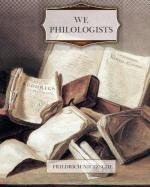The preference for antiquity as an abbreviation of the history of the human race, as if there were an autochthonous creation here by which all becoming might be studied.
The fact actually is that the foundations of this preference are being removed one by one, and if this is not remarked by philologists themselves, it is certainly being remarked as much as it can possibly be by people outside their circle. First of all history had its effect, and then linguistics brought about the greatest diversion among philologists themselves, and even the desertion of many of them. They have still the schools in their hands: but for how long! In the form in which it has existed up to the present philology is dying out; the ground has been swept from under its feet. Whether philologists may still hope to maintain their status is doubtful; in any case they are a dying race.
30
The peculiarly significant situation of philologists: a class of people to whom we entrust our youth, and who have to investigate quite a special antiquity. The highest value is obviously attached to this antiquity. But if this antiquity has been wrongly valued, then the whole foundation upon which the high position of the philologist is based suddenly collapses. In any case this antiquity has been very differently valued, and our appreciation of the philologists has constantly been guided by it. These people have borrowed their power from the strong prejudices in favour of antiquity,—this must be made clear.
Philologists now feel that when these prejudices are at last refuted, and antiquity depicted in its true colours, the favourable prejudices towards them will diminish considerably. It is thus to the interest of their profession not to let a clear impression of antiquity come to light; in particular the impression that antiquity in its highest sense renders one “out of season?" i.e., an enemy to one’s own time.
It is also to the interest of philologists as a class not to let their calling as teachers be regarded from a higher standpoint than that to which they themselves can correspond.
31
It is to be hoped that there are a few people who look upon it as a problem why philologists should be the teachers of our noblest youths. Perhaps the case will not be always so—It would be much more natural per se if our children were instructed in the elements of geography, natural science, political economy, and sociology, if they were gradually led to a consideration of life itself, and if finally, but much later, the most noteworthy events of the past were brought to their knowledge. A knowledge of antiquity should be among the last subjects which a student would take up; and would not this position of antiquity in the curriculum of a school be more honourable for it than the present one?—Antiquity is now used merely as a propaedeutic for thinking, speaking, and writing; but there was a time when it was the essence of earthly knowledge, and people at that time wished to acquire by means of practical learning what they now seek to acquire merely by means of a detailed plan of study—a plan which, corresponding to the more advanced knowledge of the age, has entirely changed.




